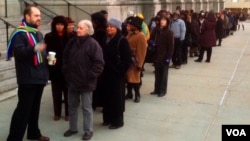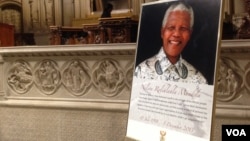NEW YORK —
Like uncounted millions of others around the world, many New Yorkers felt profound respect and admiration for Nelson Mandela, the anti-Apartheid activist and political prisoner who became the first black president of South Africa. At his death last week at the age of 95, Mr. Mandela had become a potent symbol of racial struggle and the possibility of reconciliation between foes. Prior to a memorial service for Mr. Mandela in New York’s historic Riverside Church, attendees were asked by VOA about “their Mandela” and what his legacy will be.
An upbeat, yet somber crowd of 2,000 or more mourners slowly filed into Riverside Church in Manhatten late Wednesday, relieved to be out of the bitter cold and eager to pay homage to the late Nelson Mandela, who had been hosted and celebrated inside this very church in 2005.
Adam Fraser was only two years old at the time, but he has been often told of Mr. Mandela’s 27 years as a political prisoner on Robben Island, off Cape Town.
"And yet his spirit wasn’t broken when he came out in 1990," Fraser said. "He was willing to stand for what he believed in, even if that meant life in prison which he could have gotten."
For Martina Bouey, a Bostonian who travelled here to attend this service, Mr. Mandela represented the victory of love over fear and fury.
"He embodied that to me. Being able to suffer such oppression and anger and hatred coming toward him, and then to still be able to mend fences and still be able to reach out even to his jailer and to make policy and to say ‘at the end of the day we are all human beings and we have to figure this out together," Bouey said.
Bouey also conveyed to VOA what she hoped to come away with emotionally from the service.
"It’s an opportunity to pay my respects and to be able to express gratitude and thankfulness for his life and for what he did for the whole world - even though he may not have known he was doing it for the whole world when he was doing it," she said.
As a post-Apartheid citizen, David, a young South African working temporarily in New York, knows that Mr. Mandela is considered “the Father of His Country.” Yet he has a more intimate connection with the man dating back to a party he attended when he was 10 years old.
“I was sitting someplace off center with my brother and he was just walking around and he came down and sat next to us and just started talking. But he had this magical way of just focusing in on you and making you feel like you were the center of the universe while you were in his presence. He was a fantastic guy," David said.
For Stephanie Urdang, a white South African who remembers the harshest days of Apartheid and who now lives in New York, it isn’t Mr. Mandela’s embrace of others, but the world’s embrace of Mr. Mandela, that seems most remarkable.
“What’s struck me in the last few days, just watching the media and watching the memorial in South Africa is he is a universal figure" Urdang said. "He is everybody’s. And that’s what’s so amazing, everybody in the world sees him as their moral compass, I think."
Nelson Mandela will lie in state in Pretoria, the South African capital, until Saturday, when he will be moved to his birthplace, Qunu, for a funeral service and burial on Sunday.
An upbeat, yet somber crowd of 2,000 or more mourners slowly filed into Riverside Church in Manhatten late Wednesday, relieved to be out of the bitter cold and eager to pay homage to the late Nelson Mandela, who had been hosted and celebrated inside this very church in 2005.
Adam Fraser was only two years old at the time, but he has been often told of Mr. Mandela’s 27 years as a political prisoner on Robben Island, off Cape Town.
"And yet his spirit wasn’t broken when he came out in 1990," Fraser said. "He was willing to stand for what he believed in, even if that meant life in prison which he could have gotten."
For Martina Bouey, a Bostonian who travelled here to attend this service, Mr. Mandela represented the victory of love over fear and fury.
"He embodied that to me. Being able to suffer such oppression and anger and hatred coming toward him, and then to still be able to mend fences and still be able to reach out even to his jailer and to make policy and to say ‘at the end of the day we are all human beings and we have to figure this out together," Bouey said.
Bouey also conveyed to VOA what she hoped to come away with emotionally from the service.
"It’s an opportunity to pay my respects and to be able to express gratitude and thankfulness for his life and for what he did for the whole world - even though he may not have known he was doing it for the whole world when he was doing it," she said.
As a post-Apartheid citizen, David, a young South African working temporarily in New York, knows that Mr. Mandela is considered “the Father of His Country.” Yet he has a more intimate connection with the man dating back to a party he attended when he was 10 years old.
“I was sitting someplace off center with my brother and he was just walking around and he came down and sat next to us and just started talking. But he had this magical way of just focusing in on you and making you feel like you were the center of the universe while you were in his presence. He was a fantastic guy," David said.
For Stephanie Urdang, a white South African who remembers the harshest days of Apartheid and who now lives in New York, it isn’t Mr. Mandela’s embrace of others, but the world’s embrace of Mr. Mandela, that seems most remarkable.
“What’s struck me in the last few days, just watching the media and watching the memorial in South Africa is he is a universal figure" Urdang said. "He is everybody’s. And that’s what’s so amazing, everybody in the world sees him as their moral compass, I think."
Nelson Mandela will lie in state in Pretoria, the South African capital, until Saturday, when he will be moved to his birthplace, Qunu, for a funeral service and burial on Sunday.





